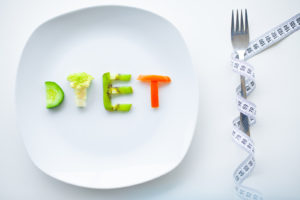
Natural Eye Health Starts and Ends with Your Diet
Your diet plays a huge role in the health of your eyes. What you put in your body either fuels or harms it. This does not necessarily mean that you need to lose weight to have healthy eyes, or, that you need to gain weight. It’s about what your diet consists of and the nutrients you’re getting regularly. Going on a strict diet could, in fact, be bad for your eyes if it doesn’t also include all the necessary nutrients.
It’s vital that you have the right amounts of vitamins and minerals in the food you eat to protect and nourish your eyes. Vegetables are a great place to start.
How many do you eat each day? Are they vegetables that have enough vision-boosting nutrients? This can be difficult to know because vegetables don’t come with an ingredient list. How do you tell how much of each vitamin and mineral you are getting? How do you know how much of each vitamin and mineral you need each day?
This can actually get quite complicated. Our bodies store some vitamins until we need them. Others are flushed out of our bodies if we don’t use them that day.
Of course, some foods are better for your eyes than others. An eye-healthy diet consists of foods that naturally contain the nutrients that your eyes need to function at their very best. The best part is that many of these foods are ones that you probably already eat.
Concentrate on foods containing vitamins A, C, and E. Some common foods that contain these vitamins are the following:
 Kiwis
Kiwis- Oranges
- Tomatoes
- Peppers
- Dried apricots
- Raw carrots
- Collard greens, kale, spinach
- Green beans
- Brussels sprouts
- Green peas
- Broccoli
- Nuts of all kinds
- Seeds
- Dairy products
- Eggs
Antioxidants
Antioxidants work to remove harmful things from your body. Sometimes this includes damaged cells. But, it can also mean toxic substances that our bodies produce or that we consume. Antioxidants are an important part of your body’s defense system. They also protect your eyes from vision-threatening conditions. AMD and other age-related illnesses are more likely to develop if you don’t get enough antioxidants. When free radicals can run wild in your body, diseases develop. Antioxidants keep the free radicals at bay.
Your eyes need antioxidants to keep them healthy and working at their best. Two must-have antioxidants for healthy eyes are lutein and zeaxanthin. Fruits and vegetables are the best natural sources of these antioxidants.
You can find lutein in mangos, bilberries, and yellow peppers. Green leafy vegetables like spinach, collard greens, chard, broccoli, and kale are also excellent sources of lutein.
Some good sources of zeaxanthin include orange sweet peppers, sweet corn, broccoli, oranges, eggs, spinach, and tangerines.
As you can see, some of the foods on the vitamin list are also on the antioxidant list. That’s a lucky bonus if you are trying to budget your grocery bill. Trying to fit all these fruits and vegetables into your daily menu can be time consuming and expensive. Another benefit is that in many parts of the world, vegetables are less expensive than meats. People still grow their own vegetables in these places, so this could be a really low-cost diet.
Changing Your Diet
Americans have it a little harder because we are used to all the prepared foods and takeout foods available in the markets. And, vegetables are more expensive than processed foods in most stores. Very few of these prepared foods contain the nutrients we need for vision health. Some still contain vegetables, but many of the vitamins are destroyed during the preparation process. One of the most difficult parts of changing to an eye-healthy diet is retraining yourself. These days, many people grow up with microwave meals and frozen foods that are quick to prepare.
An eye-healthy diet requires more vegetables – either raw or cooked – and much less meat. Red meat is particularly bad for your vision. Fish and chicken are much better for you if you feel a craving for meat. Although, how you cook it can change it from good for you to bad for you. Try to avoid deep frying or even pan-frying whenever possible. If you do have the urge for fried foods, try using canola oil, olive oil, or avocado oil to fry in.
Olive oil is the best oil, as it is heart-healthy, contains many antioxidants and has anti-inflammatory properties. But, it doesn’t always stand up to deep frying. For that, you’d need to go with light olive oil, rather than extra virgin olive oil. Canola oil actually contains some of the necessary omega-3 fatty acids that our bodies need. Fish and nuts may also contain good amounts of this “good fat”. Yes, we said “good” along with “fat” in the same sentence! Omega-3s are an important fatty acid that our bodies cannot produce. Most people do not get enough of this fat in their daily diets.
The Right Vitamins
Ensuring you get each nutrient from your diet can be tedious. There is an easier way to make sure you are getting all the vitamins and antioxidants necessary for healthy eyes; an eye vitamin supplement. With this option, you get the correct amount of vitamins, minerals, and nutrients that your eyes need. This removes the worry you may be feeling about whether some vitamins are already stored in your system or not.
Natural eye health may seem like a lot more work. In the end, you not only get the benefits of stronger eyes, but you also get a healthier body as well. By eating the foods that provide your eyes with the best sources of vitamins and minerals, you are also supplying the rest of your body with these necessary ingredients. Many of the weight problems experienced by people today are caused by eating takeout foods, prepared foods and foods high in saturated fats.
Since all of these are things that should be avoided in an eye-healthy diet, you could also end up losing a bit of weight. For many of us, that’s not a bad thing!
Our Rebuild Your Vision Ocu-Plus Formula Contains All 17 Vitamins, Minerals, and Herbal Supplements to Improve Your Eye Health!












Sorry, derrick. No plant food is a source of vitamin A. They may be a source of betacarotene whish is a precursor of vitamin A – that is why all people incorrectly name plant foods as vitamin A sources.
However, the fact is that the conversion is beyond poor (1 % or so) and is especially poor in people who need it most . So you woul have to eat 15 or 20 kilos of such foods per day, every, day, and you still would not get enough Vitamin A.
You don’t know what you’re talking about. You should pull your comment down you look so stupid.
And u did’nt include watermelon also which is a rich source of vitamin a and is good for the eyes.Thnks once again.
thnks sir 4 d info,those fruits u listed ar good for eye health.But u did’nt include onion,i heard is good for the eyes.
This is good information about the vegetables. The recommendation of using canola needs to be investigated. It is not going into my body!
Thank you so very much for this information. I find it extremely helpful. I have but this information to work for me.
Thanks again!
Maryanne
hey no more eating junk food. i try to eat healthy in hopes it fights my eye problems. 🙂